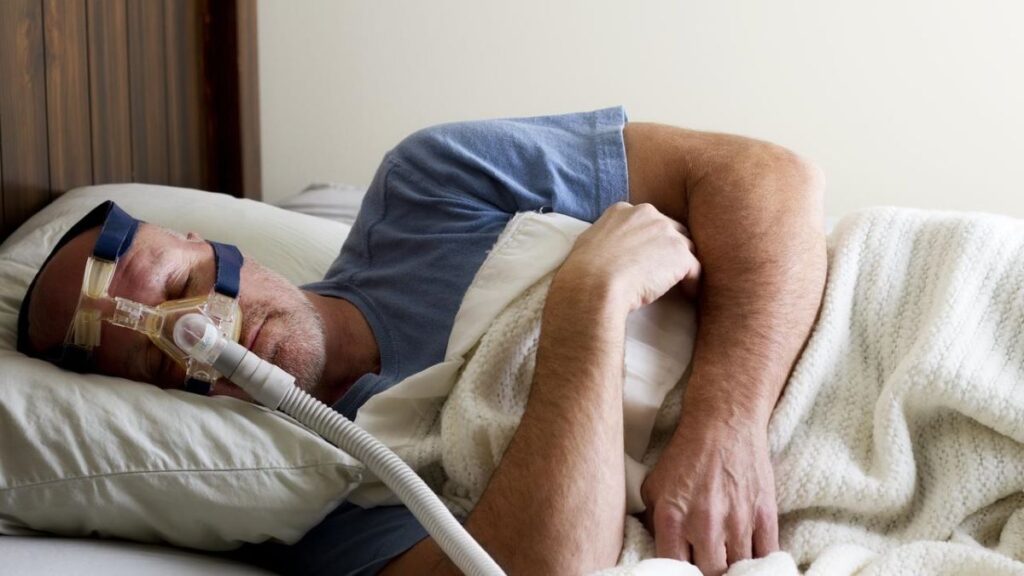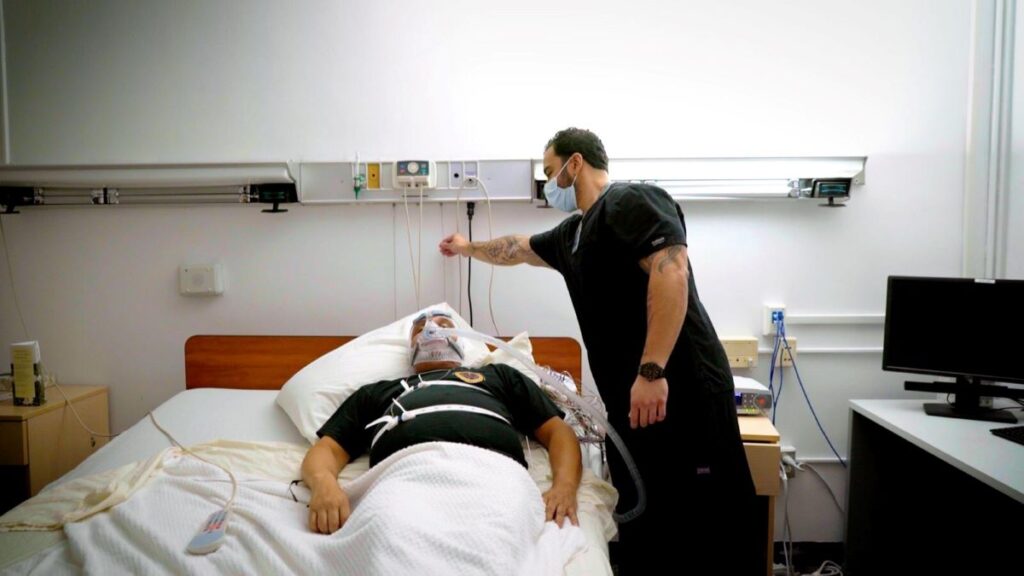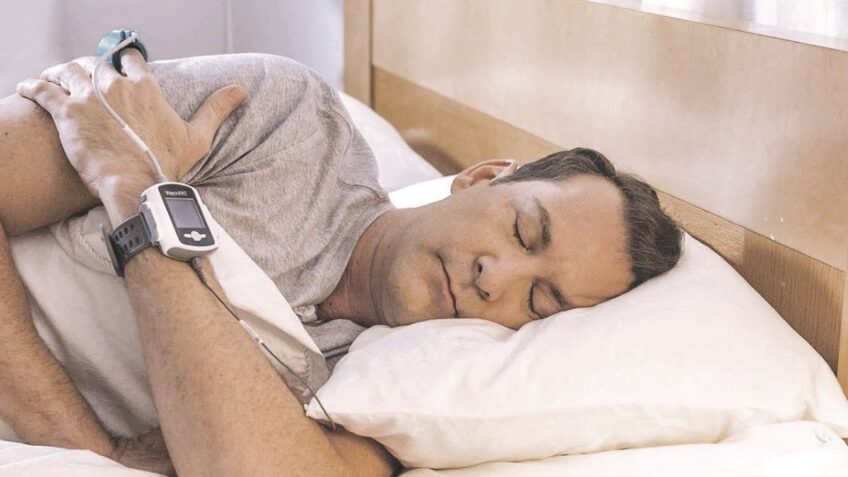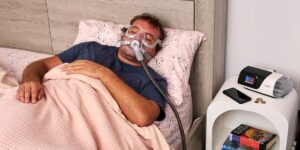What Is a Sleep Study and Why Is It Important?
A sleep study is a detailed medical examination that tracks your body’s movements and functions while you sleep. Its main purpose is to detect any potential sleep disorders you may have. These tests are vital as they offer valuable information about how you sleep, any irregularities in your breathing, and the activity of your nervous system during rest.
The Importance of Polysomnography
Polysomnography is considered the most reliable method for diagnosing sleep disorders, and understanding the Perth sleep study cost can help you prepare for this important test. The procedure uses advanced technology to record multiple body functions at the same time, giving specialists a complete picture of your sleep health.
Here’s what typically happens during a polysomnography:
- Brain activity (EEG): Sensors are placed on your scalp to measure brain wave activity.
- Heart monitoring (ECG): Electrodes are attached to your chest to track heart rate and rhythm.
- Breathing patterns: Devices are positioned near your nose and mouth to observe airflow and breathing.
- Oxygen levels: A pulse oximeter is used to measure oxygen concentration in your blood.
- Muscle and eye movements: Sensors are placed on your legs to detect muscle activity, while devices near your eyes record eye movement.
This comprehensive data collection ensures accurate diagnosis of conditions such as sleep apnea, insomnia, and other sleep-related issues.
Conditions Diagnosed by Sleep Studies
Sleep studies can help identify various conditions that significantly affect your sleep quality:
- Sleep apnoea – interruptions in breathing during sleep
- Insomnia – difficulty falling or staying asleep
- Restless leg syndrome – uncomfortable sensations causing leg movement
- Narcolepsy – excessive daytime sleepiness
- Parasomnias – abnormal behaviours during sleep
The Benefits of Accurate Diagnosis
Getting an accurate diagnosis through professional sleep studies allows healthcare providers to create specific treatment plans tailored to your needs. Without proper evaluation, sleep disorders can lead to severe health issues such as heart disease, diabetes, and memory problems.
Investing in a thorough sleep study often proves crucial for uncovering the underlying cause of your sleep-related symptoms. This knowledge enables healthcare professionals to implement effective therapies that restore healthy sleeping patterns.
What Are the Different Types of Sleep Studies Available in Perth?
Perth offers several types of sleep studies designed to meet different diagnostic needs and patient preferences. Each study type uses specific monitoring techniques to capture essential data about your sleep patterns and breathing behaviours.
1. Comprehensive Overnight Polysomnography
Comprehensive overnight polysomnography represents the gold standard for sleep disorder diagnosis in Perth. This detailed study takes place at specialized sleep centres where you spend an entire night under professional supervision. During overnight polysomnography Perth facilities conduct, trained technologists monitor multiple body functions simultaneously:
- Brain wave activity through electroencephalography (EEG)
- Eye movements via electrooculography (EOG)
- Muscle tension using electromyography (EMG)
- Heart rhythm through electrocardiography (ECG)
- Breathing patterns and airflow measurements
- Blood oxygen levels with pulse oximetry
- Leg movements during sleep
The comprehensive nature of this study allows sleep specialists to diagnose complex conditions including sleep apnoea, periodic limb movement disorder, REM behaviour disorder, and narcolepsy. You arrive at the sleep centre in the evening, where technologists attach monitoring sensors before you settle into a comfortable, hotel-like room.
2. Home Sleep Apnea Testing
Home sleep apnea testing provides an alternative approach for patients suspected of having obstructive sleep apnoea. This portable option uses simplified monitoring equipment that you can operate in your own bedroom. The home-based system typically measures airflow, breathing effort, blood oxygen levels, and heart rate – sufficient data for diagnosing sleep apnoea in appropriate candidates.
Perth’s sleep study options ensure you receive the most suitable diagnostic approach based on your symptoms, medical history, and suspected sleep disorders.
2. Home-Based Sleep Apnea Testing
Home-based sleep apnea testing is a convenient and cost-effective alternative to comprehensive overnight polysomnography for diagnosing obstructive sleep apnea. This method uses portable monitoring equipment that you can use in the comfort of your own bedroom, eliminating the need for an overnight stay at a specialised sleep centre.
The portable devices typically monitor essential parameters including:
- Airflow patterns through nasal and oral sensors
- Blood oxygen levels via pulse oximetry
- Chest and abdominal movement to detect breathing effort
- Heart rate variability throughout the night
Companies like Air Liquide Healthcare provide these home sleep apnea testing services across Perth, offering patients validated diagnostic solutions that sleep physicians can interpret accurately. The equipment is delivered to your home with clear instructions, and you simply attach the sensors before sleep and return the device the following day.
This testing method significantly reduces costs compared to overnight polysomnography Perth facilities while maintaining diagnostic accuracy for sleep apnea detection. The streamlined process makes it easier for patients with scheduling constraints or concerns about facilities to get evaluated for sleep disorders.
3. Multiple Sleep Latency Tests and Other Specialized Tests
Multiple Sleep Latency Tests (MSLT) are an important diagnostic tool for assessing excessive daytime sleepiness and narcolepsy. This test is conducted during the day, usually after an overnight polysomnography Perth session. The MSLT measures how quickly you fall asleep in quiet, comfortable conditions during scheduled nap opportunities throughout the day.
Perth sleep centres offer several specialized sleep studies beyond standard home sleep apnea testing and comprehensive overnight polysomnography:
- Maintenance of Wakefulness Test (MWT) – assesses your ability to stay awake during sedentary activities
- Split-night studies – combine diagnostic testing with CPAP titration in a single session
- CPAP titration studies – determine optimal pressure settings for sleep apnea therapy
- Pediatric sleep studies – tailored protocols for children with specific monitoring requirements
These specialized types of sleep studies require advanced equipment and extended monitoring periods, which can directly affect pricing structures. Sleep physicians decide which specific tests you need based on your symptoms, medical history, and initial screening results. Each specialized study has its own protocols, staffing needs, and analysis procedures that impact the overall cost calculation.
How Do Professional Fees Affect the Cost of a Sleep Study?
Professional fees sleep study costs in Perth depend heavily on the expertise and qualifications of the medical team involved in your diagnostic process. Sleep technologists who administer overnight studies require specialised training to operate complex monitoring equipment and ensure accurate data collection throughout the night. Their technologist salary impact directly influences the overall pricing structure, as experienced technologists command higher rates due to their ability to handle technical challenges and patient care requirements.
Specialist fees Perth vary significantly based on the sleep physician’s credentials and experience level. Board-certified sleep medicine specialists typically charge premium rates for their interpretation services, as they possess advanced training in identifying complex sleep disorders from polysomnography data. You’ll find that specialists with decades of experience or those affiliated with prestigious medical centres often command higher fees compared to newly qualified practitioners.
The complexity of your sleep study also affects professional fee structures. Studies requiring multiple specialists for interpretation – such as cases involving both sleep apnea and neurological conditions – naturally incur higher professional costs. Some facilities employ teams of technologists for comprehensive overnight studies, while simpler home-based tests may require minimal professional oversight.
Private practice specialists generally charge different rates compared to those working within public hospital systems, creating price variations across Perth’s sleep study landscape. You should expect professional fees to represent approximately 40-60% of your total sleep study cost.
How Does Equipment and Technology Influence Pricing?
The cost of sleep study equipment is a significant part of your overall expenses. Healthcare providers need to spend a lot on advanced monitoring technology. These top-notch devices constantly monitor various bodily functions throughout the night, such as brain activity, heart rate, oxygen levels, and breathing patterns. To make accurate diagnoses, we need equipment that can detect even the tiniest changes in your sleep patterns, which means sleep centres have to invest a lot of money upfront.
The Cost of Sleep Study Equipment
Here’s a breakdown of how different types of sleep study equipment impact pricing:
- Portable Monitoring Devices: These devices are used in home-based studies and generally cost less than comprehensive laboratory equipment. However, they still require regular calibration and maintenance.
- Clinical Polysomnography Systems: Advanced polysomnography systems used in clinical sleep laboratories can be quite expensive, with costs reaching tens of thousands of pounds per bed setup. These systems include multiple channels for monitoring brain waves (EEG), belts for measuring respiratory effort, sensors for tracking airflow, pulse oximetry for measuring oxygen levels, heart rate monitors, video recording capabilities, and sensors for detecting leg movements.

The Impact of Technology on Pricing
The influence of technology on pricing becomes clear when we compare different types of sleep studies:
- Home Studies: These studies use simplified monitoring equipment and typically cost 30-50% less than overnight laboratory studies.
- Overnight Laboratory Studies: These studies involve more complex setups with advanced equipment and therefore come at a higher price point.
It’s important to note that while home studies may be more affordable, they have certain limitations. The reduced number of sensors used in these studies means that they may not be able to diagnose complex sleep disorders beyond sleep apnea as effectively as overnight laboratory studies.
How Do Facility Charges Impact Sleep Study Costs in Perth?
Facility charges for sleep centres are a significant part of the costs involved in running these operations. This is because sleep centres require specialised infrastructure that requires a lot of money to set up and maintain. These facilities must have controlled environments with soundproof rooms, climate control systems, and dedicated monitoring stations that operate throughout the night. To ensure accurate diagnostic results, continuous maintenance, cleaning protocols, and regular equipment calibration are necessary.
How Facility Charges Affect Sleep Study Costs
The facility charges at sleep centres directly affect the costs of your sleep study. Here’s how:
- Infrastructure Investment: Sleep centres need to invest in specialised infrastructure such as soundproof rooms and climate control systems. This investment contributes to the overall operating costs of the facility.
- Maintenance and Cleaning: Continuous maintenance and cleaning protocols are essential to keep the facility in optimal condition. These ongoing expenses are factored into the pricing of sleep studies.
- Equipment Calibration: Regular calibration of monitoring equipment is necessary to ensure accurate results. The costs associated with this calibration process are also included in the study fees.
Understanding how facility charges impact sleep study costs can help you make informed decisions when choosing a sleep centre in Perth.
Factors Influencing Facility Pricing
Several factors influence the pricing structures of sleep centres in Perth:
- Type of Facility: Private sleep centres typically charge higher rates compared to public hospital sleep labs due to their enhanced amenities and shorter waiting times.
- Staffing Requirements: The labour costs associated with employing qualified technologists, administrative staff, and cleaning personnel are built into the study fees.
- Location: Metropolitan sleep centres may have higher operating expenses compared to rural facilities, which could result in different pricing strategies.
By considering these factors, you can better understand why certain sleep centres may have higher or lower costs compared to others.
Understanding Clinic Fees in Perth
When it comes to clinic fees for sleep studies in Perth, there can be significant variations based on the type of facility you choose:
- Private Sleep Centres: These facilities often charge premium rates due to their enhanced amenities, shorter waiting times, and personalised service offerings.
- Public Hospital Sleep Labs: While these options may be more affordable, they might have longer waiting periods and more basic accommodation standards.
It’s important to weigh the pros and cons of each option based on your specific needs and preferences.
Urban vs Rural Costs
There are notable differences in pricing between urban and rural areas when it comes to sleep studies:
- Metropolitan Sleep Centres: These facilities face higher property rental costs, increased utility expenses, and competitive salary requirements for qualified staff.
- Rural Facilities: While rural facilities may offer lower base rates, they could charge additional fees for specialist consultations or equipment transport.
If you’re located in a rural area or accessing services through regional providers like Air Liquide Healthcare’s extensive network, it’s essential to consider these potential extra costs when budgeting for your sleep study.
The Impact of Location Accessibility on Pricing
The accessibility of a location can also influence pricing:
- Convenient City Locations: Sleep centres situated in convenient city locations often charge premium rates due to their prime positioning.
- Suburban Alternatives: On the other hand, suburban sleep centres may offer more affordable options but could require longer travel times or inconveniences.
When selecting a sleep centre in Perth, it’s worth considering both the cost implications and practicalities associated with different locations based on your circumstances.
How Does Geographic Location Impact Sleep Study Pricing?
Geographic cost variation plays a significant role in determining sleep study expenses across Western Australia. Perth’s central metropolitan areas typically command higher prices due to elevated living expenses influence on operational costs, including rent, utilities, and staff wages. Sleep centres located in premium suburbs such as Subiaco, Nedlands, or South Perth often reflect these increased overheads in their pricing structure.
Regional Pricing Differences
Regional pricing differences become apparent when comparing metropolitan Perth with surrounding areas. Facilities in Fremantle, Joondalup, or Rockingham may offer more competitive rates whilst maintaining quality standards. The availability of specialised sleep centres varies considerably across regions, creating supply and demand dynamics that directly affect pricing.
Challenges in Rural and Remote Areas
Rural and remote areas near Perth face unique challenges:
- Limited facility availability: often necessitates travel to metropolitan centres
- Higher operational costs: for maintaining equipment in remote locations
- Reduced competition: among providers leading to premium pricing
- Additional travel expenses: for patients seeking specialised care
Addressing Geographic Disparities
Home-based sleep studies through providers like Air Liquide Healthcare help address geographic disparities by eliminating location-dependent facility costs. This approach proves particularly beneficial for patients in outer metropolitan areas or regional centres where traditional sleep laboratories may be scarce or expensive.
Pricing Clusters in Established Medical Precincts
The concentration of sleep medicine specialists in Perth’s established medical precincts creates pricing clusters, with facilities near major hospitals typically charging premium rates for their convenient locations and comprehensive services.
What Role Does Insurance Coverage Play in Managing Sleep Study Costs?
Medicare coverage sleep study eligibility significantly impacts your out-of-pocket expenses when seeking sleep disorder diagnosis. The Medical Benefits Schedule (MBS) establishes specific criteria that determine whether your diagnostic test qualifies for government funding. You must meet particular clinical indicators and obtain proper referrals from qualified healthcare professionals to access Medicare benefits for sleep studies.
The MBS guidelines require documented evidence of sleep disorder symptoms and failed conservative treatment attempts before approving coverage. Your sleep physician must demonstrate medical necessity through comprehensive assessment and symptom documentation. Medicare typically covers polysomnography when performed in accredited facilities with appropriate medical supervision.
Private health insurance CPAP therapy coverage varies considerably between insurers and policy levels. Many private health funds include sleep disorder treatments under their extras or hospital cover packages. You should verify your specific policy details, as some insurers impose waiting periods or annual limits on sleep-related treatments.
The insurance impact on cost extends beyond initial diagnostic testing. While Medicare covers qualifying sleep studies, ongoing CPAP therapy equipment and supplies often require private insurance or direct payment. Air Liquide Healthcare’s partnerships with various sleep brands help facilitate insurance claims processing, though coverage levels depend on your individual policy terms.
You can minimise financial burden by confirming coverage eligibility before scheduling your sleep study appointment.
How Can Patients Prepare for a Sleep Study to Avoid Additional Costs?
Preparing for sleep study appointments requires careful attention to detail that can significantly impact your final costs. Proper preparation prevents complications that might necessitate repeat testing or additional procedures, both of which increase your out-of-pocket expenses.
1. Pre-study consultation Perth
Pre-study consultation Perth appointments serve as your first line of defence against unexpected charges. During these consultations, you’ll discuss your specific symptoms with healthcare professionals who can determine the most appropriate testing approach for your situation. Sleep specialists use this information to select the right equipment and testing protocols, avoiding unnecessary procedures that don’t match your symptoms.
2. Patient preparation tips
Patient preparation tips that help minimise costs include:
- Following medication guidelines – Continue or discontinue specific medications as instructed to ensure accurate results
- Maintaining normal sleep schedules – Arrive well-rested but not overly tired to prevent test interference
- Avoiding caffeine and alcohol – These substances can skew results, potentially requiring retesting
- Bringing comfortable sleepwear – Proper clothing ensures sensor placement works correctly
- Completing pre-study questionnaires thoroughly – Accurate symptom reporting helps technologists prepare appropriate monitoring setups
Sleep centres like those partnered with Air Liquide Healthcare emphasise thorough preparation protocols. Their comprehensive pre-study guidance helps patients understand exactly what to expect, reducing the likelihood of procedural complications that could extend testing time or require additional sessions. You’ll receive detailed instructions about sleep diary completion, which provides valuable baseline data that enhances test accuracy and reduces interpretation time.

What Options Are Available to Help Manage or Reduce Sleep Study Expenses?
Managing sleep study costs in Perth requires a strategic approach that begins with thorough preparation and research. You can significantly reduce your financial burden by exploring several cost-effective options available across the region.
1. Insurance verification
Insurance verification stands as your first line of defence against unexpected expenses. Contact your private health insurer to confirm coverage details for sleep studies under your current policy. Medicare covers diagnostic tests that meet MBS guidelines, making this verification process crucial for accurate cost planning.
2. Payment plans clinics
Payment plans at clinics offer flexible financial arrangements that spread costs over manageable periods. Many sleep centres in Perth provide:
- Interest-free payment options for qualifying patients
- Extended payment schedules based on individual circumstances
- Bulk billing arrangements for eligible Medicare patients
3. Low-cost sleep studies
Low-cost sleep studies become accessible through home-based testing options. Companies like Air Liquide Healthcare provide comprehensive home sleep apnea studies that eliminate facility fees whilst maintaining diagnostic accuracy. These portable solutions cost considerably less than overnight laboratory studies.
4. Bulk billing providers
You should also investigate bulk billing providers who accept Medicare payments as full settlement for eligible tests. This option eliminates out-of-pocket expenses entirely for qualifying patients.
5. Timing your study strategically
Consider timing your study strategically if you hold private health insurance. Scheduling tests early in the calendar year maximises your annual benefits allocation, reducing personal costs for any follow-up treatments or equipment requirements.





